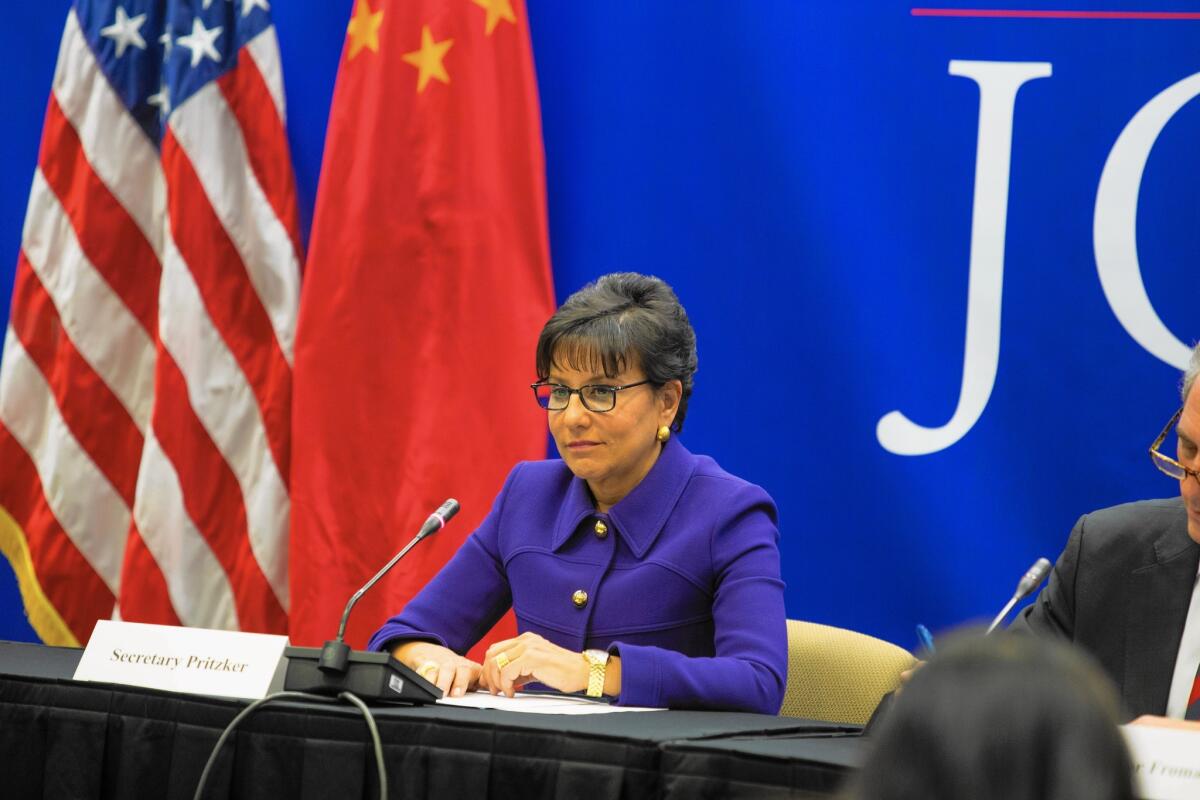Commerce secretary on Pacific trade deal: ‘It’s about market access’

“There are political ramifications for the leaders of the other countries,” Commerce chief Penny Pritzker said in explaining the need for fast-track authority.
As U.S. Commerce secretary, Penny Pritzker has spent months trying to sell Congress on giving President Obama fast-track authority to pave the way for a new trans-Pacific trade pact that the White House hopes will cut the hefty U.S. trade deficit with Japan.
It’s been a tough sell. The fast-track bill initially was blocked by Senate Democrats on Tuesday — a rebuke of the president by his own party. But Senate leaders then reached agreement to revive the bill, and a vote is expected next week. There likely will be a similar battle in the House.
Foes of the bill and the Trans-Pacific Partnership — a trade agreement involving the United States, Japan and 10 other nations, but not China — worry that the measures will undermine U.S. industries and jobs. But the trade effort’s supporters include Japanese Prime Minister Shinzo Abe.
A new trade pact with Japan and other Pacific nations could have a big effect on Southern California. Japan trails only China as the country of origin for trade shipments through the ports of Los Angeles and Long Beach.
Pritzker is an heir to the Hyatt Hotel fortune who became Commerce secretary in mid-2013. During a recent visit to Los Angeles before the Senate action this week, she talked about why the White House views the trade deal as so crucial. Here is an excerpt:
You’re a marathon runner and a triathlete; is this struggle for a trade deal starting to feel like an endurance run?
It is an endurance run. But that’s OK. There’s a real push to get this done.
How big is U.S.-Japan trade? How much is going each way?
It’s about $200 billion in goods [overall]; of that $67 billion are goods the United States exports to Japan and about $134 billion, a little shy of that, is what Japan exports to the United States.
So we have a $67-billion trade deficit with Japan. That’s not very equal.
That’s why we need these trade agreements. Market access into Japan is notoriously difficult.
Why?
[Japanese] attitudes toward outside investors are a challenge. Their corporate governance is very protectionist of entrenched management. There are [corporate] cross-shareholdings across sectors of the economy so it’s very hard to break into parts of the economy. And then there are tariffs.
That’s the tax a government imposes on imports to protect their own businesses.
Right. If you think about the average tariff in the United States, it’s about 1.4% of the price of the item.
And Japan’s tariff?
Take agriculture — it can be anywhere from 10% to 400%. The market is relatively closed.
So the White House wants two things called TPA and TPP to help fix that. Can you explain?
TPA is Trade Promotion Authority, where Congress says to the administration: “Here are the objectives that the trade agreement has to have in order for us to give it an up-or-down vote.” It’s the minimum floor that they want to see in an agreement.
That authority, known as “fast-track” authority, has been used by U.S. presidents in the past, correct?
That’s right.
[Editor’s note: The authority would allow the president to submit a new trade deal to Congress for an up-or-down vote with no amendments, which is seen as key to getting trade concessions from other nations.]
And TPP?
That’s the Trans-Pacific Partnership, a trade agreement between 12 countries, including Japan. That agreement, in order to pass Congress, has to meet the minimum standards of the TPA.
Why is it important to have the TPA first?
Because the 12 countries have said, “We’re not putting our best and final offers on the table until we know that Congress is behind the [Obama] administration negotiating trade agreements.”
You always are trading some stuff that you may not want to give away or that might be a little painful. There are political ramifications for the leaders of the other countries for making the best and final deal.
They’re saying, “Why would I do that and put myself at political risk unless I know the odds are — if we come to agreement — the deal is going to be passed by Congress?”
Why should Americans care whether this all gets done?
It’s about market access for our companies, and it’s about jobs for our middle class. It’s very easy for foreign companies to sell into the United States. Our companies often can’t get market access. Tariffs abroad and market access abroad are very difficult.
What do your critics say?
The critics are concerned about the implications for jobs [from higher imports]. They’re worried that our companies and our workers might get hurt. There have been times [in past trade deals] when they have been hurt. The question is, is this [deal] a net-net good for the American worker? Certainly the president’s view, and my view, is yes, it is.
Isn’t there a fear that added imports would cause more harm to American industry and jobs, even if American exports to Japan and the other Pacific nations also go up?
That might be the fear but I don’t think it’s the reality. Remember, today [those nations] can sell their goods here anyway, it’s not so difficult. For us it’s about access into their markets.
Don’t some U.S. labor leaders object to all of this?
Some union labor leaders worry about their fears about jobs, so there’s an honest disagreement here. I don’t think they’re right and certainly the president doesn’t think they’re right.







